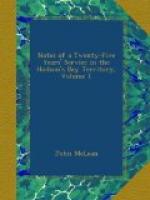Setting off, therefore, in “light marching order,” I immediately gained the high grounds, in order to keep clear of the underwood that covers the banks of the river; and just as the moon appeared above the surrounding hills, arrived on the banks of a small stream, where I observed a portage path sunk deep in the ground, a circumstance which proved it to be much frequented—by whom or for what purpose I could not say, for I had seldom passed the limits of my farm during last winter, and was nearly as ignorant of the topography of the environs as the first day I arrived. I had not heard of the existence of a river in the quarter, nor did I imagine there was any; the conclusion I arrived at therefore was, that I had lost my way, and that my most eligible course was, to endeavour to find the main stream, and by following it, retrace my course to the portage.
I soon fell on the river, but my retrograde march proved exceedingly toilsome; at every step I was obliged to bend the branches of the underwood to one side and another, or pressing them down under my feet, force my way through by main strength: some short spaces indeed intervened, that admitted of an easier passage; still my progress was so slow that the sun appeared before I reached the upper end of the portage. Finding an old canoe here, belonging to the post, I resolved on crossing to the opposite side of the river, where I knew there was a path that led to the house, by which the Indians often passed when travelling in small canoes. I accordingly ran to the lower end of the portage for a paddle, where I found my men still asleep; and having heard that the lower end of this path came out exactly opposite to the upper end of the portage, I struck out into the woods the moment I landed, fancying that I could not fail to discover it.
The sun got higher and higher as I proceeded, and I went faster and yet faster, to no purpose;—no path appeared; and I at length became convinced that I was lost—being equally in difficulty to find my way back to the river as forward to the post.
The weather was very sultry; and such had been the drought of the season that all the small creeks were dried up, so that I could nowhere procure a drop of water to moisten my parched lips. The sensations occasioned by thirst are so much more painful than those we feel from hunger, that although I had eaten but little the preceding day, and nothing on that day, I never thought of food. While my inner man was thus tortured by thirst, my outer man scarcely suffered less from another cause. The country through which I passed being of a marshy nature, I was incessantly tormented by the venomous flies that abound in such situations,—my shirt, and only other habiliment, having sustained so much damage in my nocturnal expedition, that the insects had free access partout.[1]




